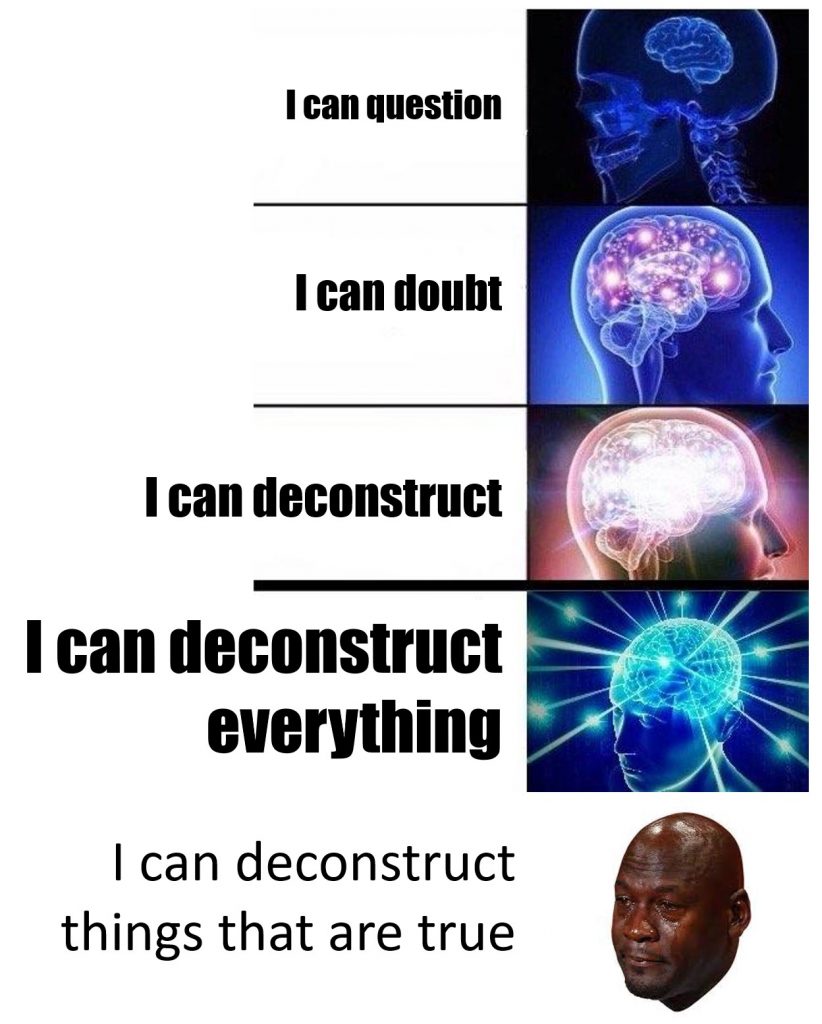Twenty years after my own graduation, I have come gradually to understand that the liberal arts cliché about teaching you how to think is actually shorthand for a much deeper, more serious idea: learning how to think really means learning how to exercise some control over how and what you think. It means being conscious and aware enough to choose what you pay attention to and to choose how you construct meaning from experience.
-David Foster Wallace, This is Water
If we don’t have some basic principles and ground rules that we adhere to, it’s very possible to think our way into delusion and confusion and all kinds of mental problems. A recent conversation about depression led me to ask myself about my own cognitive ground rules, including the ones related to my thinking around faith. We sometimes call these assumptions, and these are the ones I choose to adhere to.
- Anything, whether true or false, can be deconstructed. So the fact that I or anyone else can deconstruct something does not automatically mean it deserves my skepticism.
- My feelings are not an accurate guide to reality. They are just a data point.
- My exercise of reasoning skills follows from non-rational factors like my culture, my intuitions, and even my moods and my physical health. So like my feelings, my powers of reason are not always a good guide to reality.
- My paradigm is not always accurate.
- Reality is generally stranger than we assume it to be. So the fact that something doesn’t fit my paradigm does not mean that thing is not real. Statements like That doesn’t seem… and That doesn’t work for me… are not enough; to declare something unreal requires more than just an appeal to my paradigm.
- I have cognitive, emotional, and other biases, and this is also true of people who I look to for information. The idea of “bias-free” sources is a naïve fiction, and the best sources of information are the ones that are self-aware, and forthcoming about their biases.
- One of the main differences between humanity and God is that God engages with reality perfectly. By contrast, much of human behavior (including mine) consists of denial, avoidance, and rejection of reality. In my seeking, I need to account for those tendencies in myself and my sources.
- It is never, ever good to deny reality.
- We create narratives of reality. What the scriptures call “eternal life” involves the ongoing surrender of my narratives of reality in favor of God’s narratives, God’s perceptions, God’s understanding of reality. This is the straight and narrow path that few people adhere to because it’s immensely difficult and it involves a lot of grieving over our delusions.
- My attitude toward reality is discernible. A refusal to live in reality leads to observable states of being: agitation, restlessness, panic, daydreaming, rumination, emotional volatility, and neurosis. Acceptance of reality leads to poise, patience, flexibility, resilience, and strength.
- Reality doesn’t care whether I like it or not. Reality doesn’t care whether I think it should be something different from what it is. My opinion of what reality should be has zero value. When I ask a gospel question, I benefit from first asking if my question is just an attempt to avoid accepting a reality I don’t like.
- The best use of my mind is to grow in my capacity to engage well with reality. The worst use of my mind is to rage against reality and complain about it. My mental health depends upon my mature engagement with reality.
- God speaks to prophets, and because He is a God of order he will almost never reveal something that contradicts the consistent and united voice of His prophets. Part of eternal life is embracing God’s order against forces of chaos.
- God is more pragmatic than we tend to assume. Revelation usually comes to humanity in whatever form maximizes our understanding, and it needs to be discerned and interpreted.
- If someone claims revelation that goes against prophetic revelation, the burden falls on them to demonstrate that their capacity, framework, and track record for revelatory discernment are superior to those of the governing councils of the church.
- Because I want to be trusted with more revelation, If God reveals something to me then it is settled. It does not matter at all whether or not I personally like any particular truth that I have received. Depending on the concept or issue I might have to adjust my mental model in some ways over time, but if the core reality was revealed by God, then it’s fully settled and never open for renegotiation.


4 thoughts on “It’s good to have cognitive ground rules”